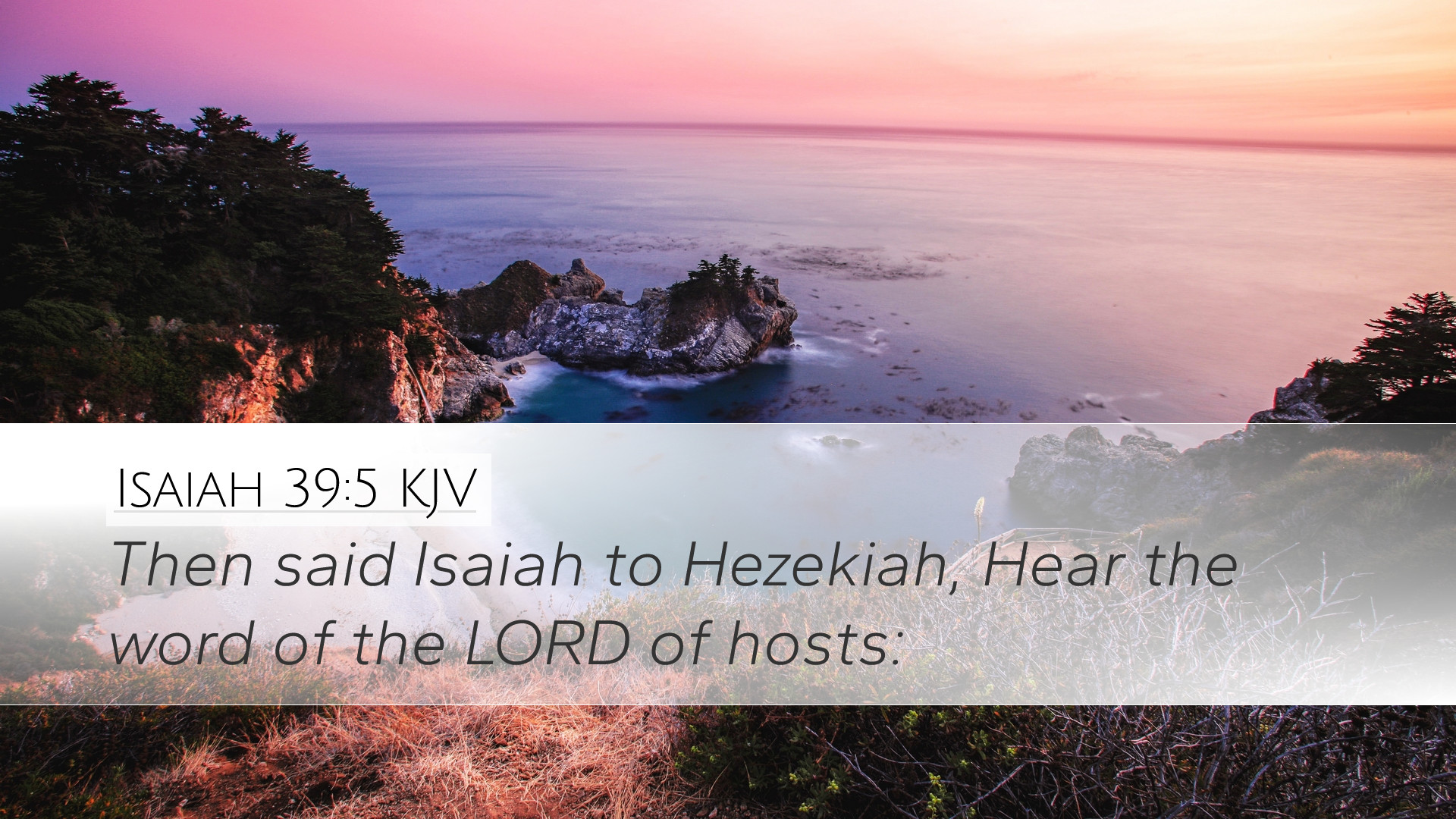Commentary on Isaiah 39:5
Isaiah 39:5 states: "Then said Isaiah to Hezekiah, Hear the word of the Lord of hosts." This verse comes at a pivotal moment in the narrative of King Hezekiah's life, marking a significant transition in the messaging of the prophet Isaiah, who serves both as a messenger and a divine instrument of God's will. The message delivered here has profound implications for the future of Judah and the fate of Hezekiah's house.
Contextual Background
To fully comprehend the weight of Isaiah 39:5, one must consider the historical and spiritual context surrounding the reign of King Hezekiah. Hezekiah is often remembered as a reforming king who did what was right in the eyes of the Lord (2 Kings 18:3). However, Chapter 39 represents a shift in the narrative wherein God reveals the consequences of Hezekiah's actions and decisions. The preceding chapters document Hezekiah’s illness and miraculous recovery, followed by prideful displays before the envoys from Babylon, leading to divine judgment.
Commentary Insights
Matthew Henry's Commentary
Matthew Henry emphasizes that the message delivered in Isaiah 39:5 arises from a contrast between Hezekiah's earlier faithfulness and the subsequent pridefulness exhibited when he showed riches and treasures to the Babylonian envoys. Henry points out that this act displayed a momentary lapse in judgment, suggesting reliance on human alliances rather than divine providence. He interprets this moment as a reflective warning to believers: the need for humility and dependence on God rather than earthly power and prestige.
Albert Barnes' Notes on the Bible
According to Albert Barnes, this verse signifies the transition from a direct endorsement of Hezekiah's faithful service to a sobering declaration of impending judgment. Barnes notes that the “word of the Lord of hosts” carries both authority and gravity, emphasizing that it is a summons to listen. He highlights that God, through Isaiah, is about to reveal the dire consequences of Hezekiah's actions—specifically, the eventual Babylonian captivity of Judah. This warning serves as an exhortation on the consequences of prideful actions post-deliverance, making it clear that spiritual failures can lead to national repercussions.
Adam Clarke's Commentary
Adam Clarke takes a more elaborative approach, dwelling on the significance of prophetic utterances. Clarke points out that Isaiah, acting as the mouthpiece of God, delivers a pivotal message that will not only affect Hezekiah but will resonate through generations. He focuses on the gravity of “the word of the Lord of hosts,” suggesting that all heavenly hosts are about to engage in what Clarke refers to as divine administration. He underscores the seriousness with which God regards human conduct, especially that of leaders. Clarke notes that this moment encapsulates the intertwining of divine sovereignty and human accountability.
Theological Reflections
Isaiah 39:5 serves as an important theological touchstone regarding the sovereignty of God and the intertwined nature of His judgment and mercy. Through this verse, it is pivotal to understand the implications of leadership and responsibility. Hezekiah’s moment of weakness directly leads to warnings delivered about the fate of his people, thus reflecting the notion that leadership is not merely a position of honor but comes with the burden of accountability before God.
Lessons for Today
- The Necessity of Humility: Hezekiah's experience serves as a lesson that pride can lead to a departure from reliance on God.
- Divine Sovereignty: God’s pronouncements through prophets are not to be taken lightly; they reflect His overarching control over history.
- The Importance of Spiritual Direction: Leaders, especially in the church, are reminded of their influence on the wider community and the need for steadfastness in faith.
Conclusion
In summary, Isaiah 39:5 encapsulates a crucial moment where God's dealings with humanity converge with the realities of human pride and folly. Through authoritative and sobering words, Isaiah reminds Hezekiah—and us—that God’s plans are often wrought through our obedience and humility. This passage serves as a cautionary tale for pastors, students, and theologians, urging a continued commitment to God’s way over the alluring distractions of worldly recognition and power.


